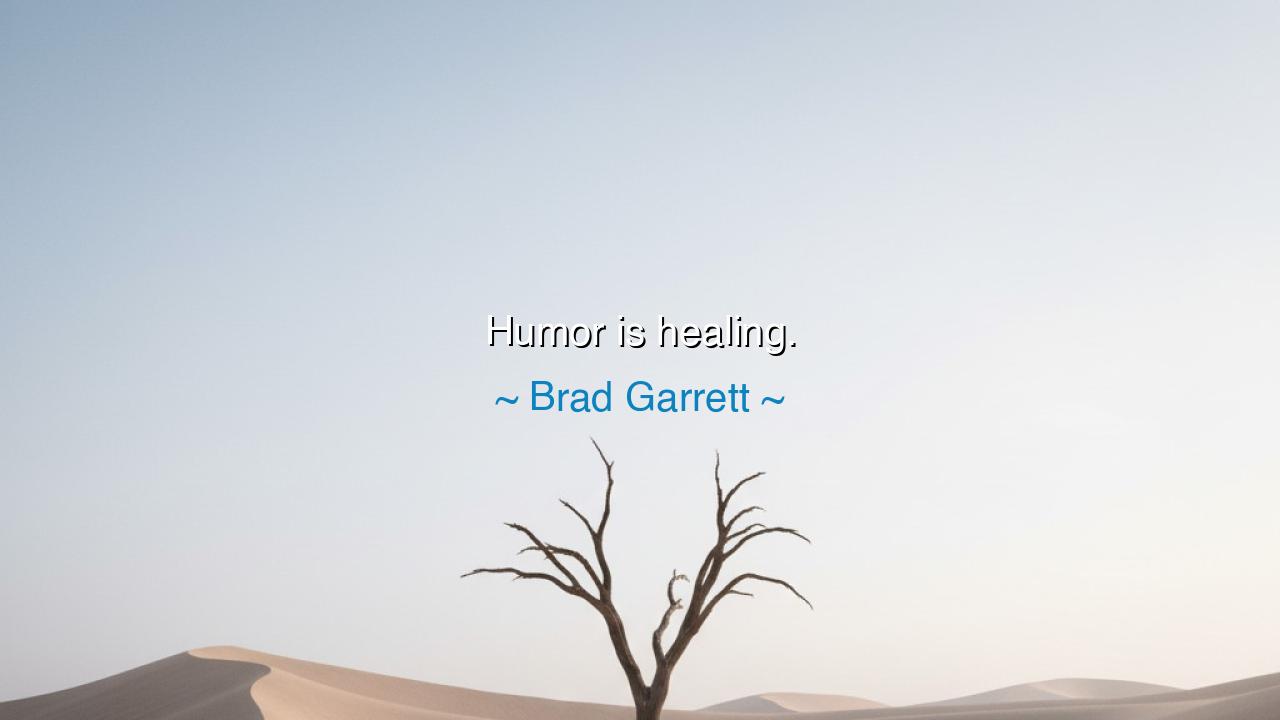
Humor is healing.






The words of Brad Garrett—“Humor is healing”—are as brief as a heartbeat and as vast as the ocean of human experience. In their simplicity lies a truth that has soothed the hearts of humankind since time immemorial: that laughter, born from humor, is not a mere sound, but a medicine for the soul. Garrett, a man who has lived his life upon the stage, using wit to ease the weight of the world, speaks here as both artist and sage. His declaration is not a jest but a revelation—that even in the shadow of sorrow, humor becomes light; even in the depths of despair, it is a balm that binds the wounds of the unseen heart.
To say that humor is healing is to understand that it reaches places no surgeon’s blade nor philosopher’s word can touch. The body may falter, the mind may tremble, but the spirit, when touched by laughter, remembers its strength. Ancient healers, long before the science of medicine, knew this truth. Among the Greeks, it was said that Hippocrates, the father of medicine himself, prescribed laughter as a cure for melancholy. He believed that joy realigned the humors of the body—the elements of life itself—and restored balance where sorrow had reigned. Even in that distant age, they knew that laughter does not erase pain, but transforms it into something bearable, something survivable.
The origin of Garrett’s wisdom lies in both personal trial and timeless observation. As an actor and comedian, he has seen the strange alchemy by which humor turns hardship into hope. To make others laugh is not merely to entertain—it is to remind them of their resilience. Garrett’s life, touched by both triumph and grief, bears witness to this truth: that those who have walked through suffering often find in humor a sacred tool of endurance. Just as a blacksmith tempers steel with flame, the soul, through laughter, tempers sorrow into strength.
Consider the story of Charlie Chaplin, the silent jester whose laughter echoed across the darkest days of the 20th century. In an age of poverty, war, and despair, Chaplin stood upon the screen and made the world laugh—not to mock its pain, but to heal it. Behind his painted smile was the ache of exile and loneliness, yet his art transformed that pain into grace. He once said, “To truly laugh, you must be able to take your pain and play with it.” This is the essence of Garrett’s truth: humor transforms suffering into survival, and survival into wisdom.
But this healing power is not confined to great artists or philosophers. It dwells in the everyday acts of courage we call laughter—in the mother who jokes through her exhaustion, in the friend who lightens a moment of grief with a smile, in the patient who finds humor even in illness. Laughter, when born from compassion, becomes communion. It says to the wounded heart, You are not alone. When we laugh together, the walls between us dissolve, and we remember that to be human is not to be perfect, but to be connected.
In the ancient East, the sages of China spoke of chi, the life force that flows through all living things. They believed that joy was one of the purest forms of this energy, a current that strengthens the body and renews the spirit. Modern science, centuries later, has caught up to this ancient wisdom, discovering that laughter releases healing chemicals, strengthens immunity, and eases pain. Yet Garrett’s insight reaches further still—it speaks to the moral and spiritual truth beneath the biological one: that laughter reconnects us to life, to others, and to the divine rhythm of renewal that never ceases.
Let this be the lesson carried forward: when the world weighs heavy upon you, do not silence your laughter, for it is your light. Seek humor not to escape life, but to embrace it. Laugh at your missteps, forgive your flaws, share joy even in struggle. In laughter, there is humility; in humor, there is hope. The heart that can still laugh is one that has not been conquered by despair.
So remember the wisdom of Brad Garrett, spoken not as jest, but as truth for the ages: “Humor is healing.” When wounds ache and hearts grow weary, find the laughter still within you. For laughter is not denial—it is defiance. It is the soul’s quiet declaration that pain will not have the final word, that even amid tears, life continues to sing. And that song—the sound of laughter—is the oldest and most beautiful medicine in the world.






AAdministratorAdministrator
Welcome, honored guests. Please leave a comment, we will respond soon